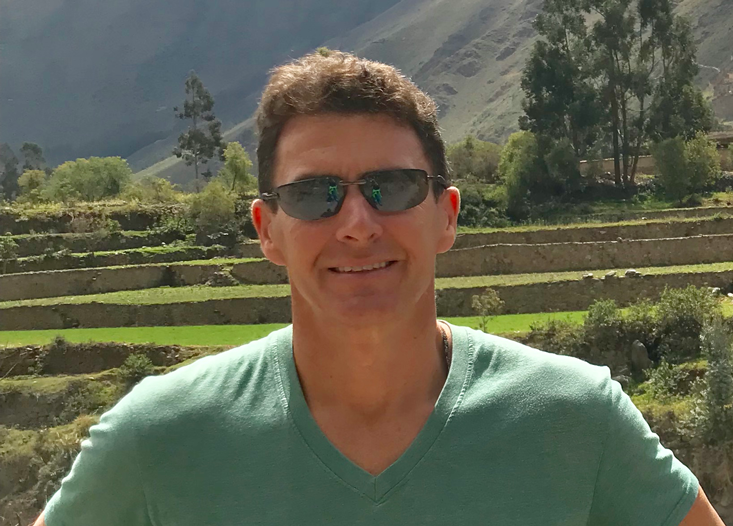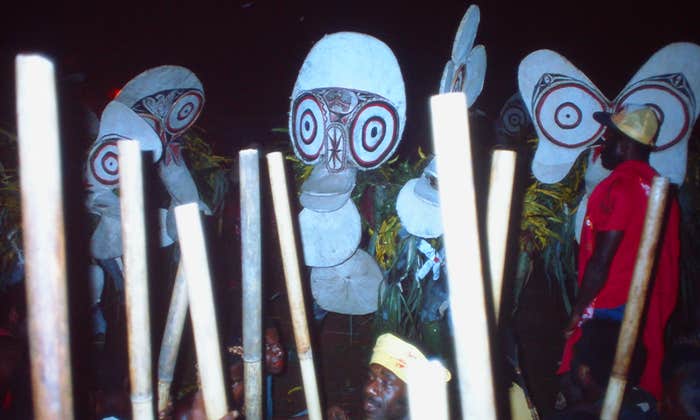A god who knows everything, is everywhere, and wields impossible power, is a potent fantasy. Allegiance to it animates the lives of billions worldwide. But this “Big God,” as psychologists and anthropologists refer to it, wasn’t dreamt from scratch but pieced together, over thousands of years, paralleling humanity’s move from small- to large-scale societies. One burning question researchers want to answer is: Did humans need belief in a God-like being—someone who can punish every immorality we might commit—to have the big societies we have today, where we live relatively peaceably among strangers we could easily exploit?
Harvey Whitehouse, the director of the Institute of Cognitive and Evolutionary Anthropology at Oxford University, doesn’t think so. “Complex societies,” he and his colleagues declared in a March Nature paper, “precede moralizing gods throughout world history.” They relied on a massive historical database, called Seshat, which over a decade attracted contributions from over a hundred scholars. With the database “finally ready for analysis,” Whitehouse and his colleagues wrote in The Conversation, “we are poised to test a long list of theories about global history,” particularly “whether morally concerned deities drove the rise of complex societies,” some hallmarks of which are more economic integration and division of labor, more political hierarchy, the emergence of classes, and dependence on more complex technology and pre-specialists. Whitehouse concluded that those deities did no such driving. As he told Nautilus in a 2014 interview, as societies became more agricultural, what researchers see “in the archeological record is increasing frequency of collective rituals. This changes things psychologically and leads to more doctrinal kinds of religious systems, which are more recognizable when we look at world religions today.”
Joseph Henrich, chair of the Department of Human Evolutionary Biology at Harvard University, sees it differently. He contends that moralizing gods spurred societal complexity because belief in moralizing gods leads to success in intergroup competition. It increased trust and cooperation among a growing population of relative strangers, he said, and buttressed traits like bravery in warfare. “The word ‘moralizing’ is not a useful term,” though, he added. “People use it casually, because people are interested in morality, but the theory specifies this very specific set of things that increase your success in intergroup competition. Most people want to call greater cooperation, helping strangers, things like that, moral. That’s just a Western preoccupation.”
I caught up with Henrich earlier this month to discuss the anthropological chicken-and-egg problem of whether gods or complex societies came first. He was gracious in defending his position that gods were the bonds that allowed societies to gain strength and grow.

How did gods help build societies?
The way to think about it is that there’s lots of different groups coming to different beliefs about their gods. You find gods that care about what kind of foods you eat, who you have sex with, how you have sex, how you treat your neighbors, how you treat strangers, and some of these things help societies to expand and grow. Some just appeal to various aspects of our psychology so they can stick around because they fit human psychology well. These beliefs are favored by some groups and lead to competition with others. And these religious beliefs, including rituals, have allowed society to scale up.
Does that help explain why certain religions have merged into the ones that we see today? For example, in the Bible, you can see traces of beings that existed in Mesopotamian myths.
Exactly. In Mesopotamia, there’s this rich exchange of different supernatural beliefs. The Jewish god is changing through time. Robert Wright has a nice book on this, The Evolution of God, showing how you go from this kind of desert war god into the god of Christianity today.
What is driving that transformation?
Things like a belief in a contingent afterlife, and a belief in free will, got picked out because they helped societies expand the sphere of social interaction. They did things like galvanize trade and incentivize bravery and warfare.
People who believe in gods that are more punishing, or more moralizing, are more generous.
If moralizing or punishing gods didn’t emerge from complex societies, what did they emerge from?
Gods that do some degree of punishing can be found across diverse societies, including among hunter-gatherers. Essentially, many gods in small-scale societies are like people, but with some extra, though limited, powers. People are punishing, sometimes, so naturally the gods are too. Intergroup competition essentially “picked out” and recombined the gods that helped societies succeed, whether by inducing cooperation or bravery in war. This meant, over time, gods became more powerful, knowing, and punishing as societies scaled up.
How do you know that small-scale societies had a moralizing god?
We have extensive ethnographic evidence from anthropological fieldwork as well as from the reports of travelers, missionaries, and others. One compilation of such evidence is called the Ethnographic Atlas, which is a compilation of 1,200 societies that anthropologists have studied. They have differing degrees of social complexity, and they have some information about the supernatural agents that people believe in. Various projects in different times and places have tried to say something about those gods, and tried to code them as moralizing or high gods or different kinds of things like that. Just from looking at that, you can get a rough sense that even by stringent criteria, these societies, that are about chiefdom level, not hunter-gatherers, will have some of these kinds of moralizing gods. Of course, there are problem with this source, so we look across many different sources.
How did competing religious beliefs spur societies to expand?
The idea is you can be more competitive against other societies. Instead of cooperating with just members of your clan, cooperate with the whole village, or some collection of villages. We’ve done experiments, where we had people divide sums of money between themselves or a member of their own village, and someone else in a more distant community. What we find is people who believe in gods that are more punishing, or more moralizing, are more equitable in how they allocate money between themselves or a member of their village in these more distant communities.
Why does a moralizing god cause people to be more equitable?
The data shows that people’s beliefs, specifically about the god’s power to punish and monitor them, is associated with their expanded pro-sociality. This suggests that at some level they don’t want to get punished.
Whitehouse and his colleagues write that social complexity precedes the advent of “moralizing gods” and hinges on an analysis of the Seshat database. In May, you published a response, “Corrected analyses show that moralizing gods precede complex societies but serious data concerns remain.” What was the problem?
Well, we show in our paper, if you look at the original data, it’s mostly not available, all the way up until God suddenly bursts into existence, which is super highly correlated with the emergence of writing. It’s kind of like society gets ready, and they write down that they have these gods, and suddenly it gets recorded in Seshat as having moralizing gods. Whitehouse and his colleagues re-coded the missing data as zeroes. They turned an absence of evidence into evidence of absence.
Many Christians today believe in a loving God. Belief in Hell is on the decline.
What do you mean when you say, in your paper, that Whitehouse’s analysis suffered from “forward bias,” and how did you correct for that?
Forward bias is the idea that any time you look back in time to estimate the first appearance of a trait—when you have evidence of that trait—you say that the trait is actually older. For example, if we find evidence that humans had fire 200,000 years ago, we can be sure that, as a statistical fact, unless we think we found the actual first time anyone ever made a fire, that we’re finding it later than it actually appeared. So dates in archeology and history are always forward biased, at least statistically. One of the analyses we did was just to minimally correct for forward bias by moving back the smallest amount of time possible in the Seshat database, which is one century. When you push things back one century, it reverses the results. So rather than social complexity preceding moralizing gods, you get moralizing gods before the big increase in social complexity.
How did religious rituals help expand cooperation in a community?
In a couple of ways. In smaller communities, high intensity rituals create solidarity with their synchronous movement, music, and dancing. To create larger imagined communities, there are doctrinal rituals where you get a group of people who repeat the same thing. As that religion expands, congregations are repeating the same words. They’re getting the same doctrine, the same beliefs. That’s guaranteeing a uniformity of beliefs. So the ritual does a lot of work in increasing people’s sociality.
There’s also doctrinal rituals about how people engage in costly sacrifice. It could be donating money, it could be sacrificing an animal, it could be just giving up your time. All of these things help persuade the next generation that these things are worth believing in. We call them “credibility enhancing displays.”
So rituals evolve to standardize the beliefs. They do things like saying words in unison, they put the words into mouths of prestigious individuals. All of this increases the cultural transition across generations. It helps the next generation believe deeply in the supernatural agent, and that’s what creates the bonds in a community.
Does this cultural transition lead to a genetic transition?
Sure, you can draw an analogy to a kind of cultural fitness. That would lead to success and intergroup competition because the norms are more successful. It also appeals to aspects of our psychology and leads to having more babies. So cultural evolution can be affected by reproduction, as well as genetic evolution. One of the things that is clearly going on is that early Christians, say third century, and Mormons in the 19th century, were having many more babies than the than people around them.
Do you think that trend is happening now?
Yes, that’s still true about Evangelical Protestantism.
Secular institutions can take the place of God. But this doesn’t work without effective secular institutions.
What about intergroup competition? Do you see that playing out among religious beliefs today?
I think you see that ISIS was a religious mutation that tried to spread, and was moderately successful in spreading for a period. It eventually got put down by secular institutions. But it’s the classic thing that in the past, sometimes they spread and die, and sometimes they take over. You can tell that story about the spread of lots of religions. Early Islam spread very rapidly over a big space of area. So I think this continues to happen.
A recent Gallup poll reported that 60 percent of Americans would now consider voting for an atheist. What do you make of declining religious belief or, at least the de-stigmatization of public atheism given the apparent role belief in moralizing gods plays in supporting cooperation amongst strangers?
The acceptance of atheists is the trailing figure on a bunch of trends, right? That same stack can be applied, for example, to having female and gay politicians—atheists are actually the lowest on that grouping. It seems clear that with the rise of strong secular institutions, representative governments, Western-style judicial processes, religion has become less and less important. And, in fact, one of the things our research shows is that it’s belief in a kind of punishing god that does a lot of the work of keeping people in line and policing people. What many Christians have today is a belief in this loving, kind God, who’s not much of a punisher. In fact, belief in Hell is on the decline. Ara Norenzayan has work showing that, if you believe God’s punishing and loving, you’re actually more likely to cheat. It’s the belief in Hell that seemed to do a lot of the work of keeping people in line.
Does research suggest that effective secular institutions can keep people in line?
Let’s say we give people a chance to allocate money between themselves and a stranger. If you prime them with God unconsciously and they’re a religious person, like a Christian or Muslim, then you get a big increase in the amount that they give. If you prime an atheist with that, you don’t get any effect. But if you prime an atheist with courts and constables and police, you also get an increase—and you get that with a religious person. So it seems like effective secular institutions can take the place of God. But this doesn’t work in places without effective secular institutions. If the police are corrupt and nobody trusts the police, priming people with the police doesn’t help.
Does this mean we don’t need to return to Judeo-Christian values for secular institutions to function well?
Right. The argument would be the Danish or the Dutch. These are places where there are high levels of atheism, very little belief in traditional religion, but super well-functioning societies. It could be like climbing a ladder: Once we build these things, then we don’t need religion anymore. But we never could have built these secular institutions without religion in the first place.
Brian Gallagher is the editor of Facts So Romantic, the Nautilus blog. Follow him on Twitter @BSGallagher.























